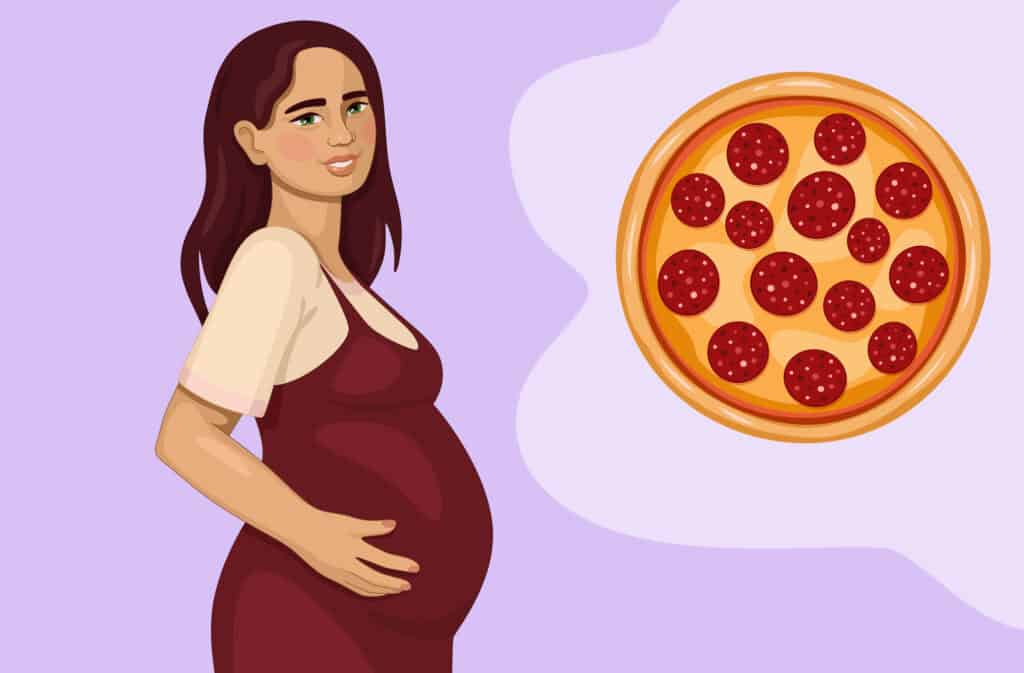Femia > Health Library > Pregnancy > Pregnancy health > Can you eat pepperoni when pregnant? Safety tips for pregnancy
Can you eat pepperoni when pregnant? Safety tips for pregnancy

- Updated Feb 10, 2025
- Published
CRAFTED BY HUMAN
Crafted by human At Femia, we provide accurate and up-to-date information at every stage of your journey, from trying to conceive, pregnancy and postnatal support. All content is created by a real person based on in-depth research and own professional experience. Femia ensures that you will receive expert advice, strict accuracy and a personalized approach from our authors/medical experts. Learn more about our editorial policy.
FACT CHECKED
Fact checked At Femia Health, we maintain the highest standards of editorial excellence in delivering content focused on helping you conceive, guiding you through pregnancy, and supporting you postpartum. Explore our content review principles to learn how we ensure the accuracy and quality of our health and lifestyle tips for every stage of your journey.
Yes, pregnant women can eat pepperoni as long as it is fully cooked. Eating raw or cold pepperoni is not recommended due to the risk of harmful bacteria. Pepperoni pizza is safe as long as the pepperoni is cooked thoroughly, and the pizza is served hot.
Pregnancy often comes with many questions about what foods are safe to eat. For those who love pepperoni, one of the most common concerns is, can you eat pepperoni when pregnant? The short answer is yes, but with some important precautions. While cooked pepperoni is safe, eating raw or cold pepperoni can increase the risk of foodborne illnesses. In this article, we’ll explore the safety of eating pepperoni during pregnancy and provide tips on how to enjoy it without worry.
Femia offers a personalized meal plan according to your pregnancy journey
Can pregnant women eat pepperoni? Understanding the risks
Pepperoni is a type of cured meat that is typically made from a mixture of pork and beef, seasoned with spices, and then dried. While the curing process helps to preserve the meat, it doesn’t fully eliminate the risk of harmful bacteria, such as Listeria or Toxoplasma gondii, which can lead to infections dangerous for pregnant women and their babies.
For this reason, it’s recommended that pregnant women avoid eating raw or cold pepperoni. These harmful bacteria are more likely to be present in uncooked or undercooked meats, and the immune system is more vulnerable during pregnancy, making the risk of foodborne illnesses higher.
Can you eat pepperoni raw?
No, it’s not safe to eat raw pepperoni during pregnancy. Although pepperoni is a cured meat, it is not cooked, and eating it raw increases the risk of infection from bacteria like Listeria. These infections can cause severe complications during pregnancy, including miscarriage, stillbirth, or preterm labor.
It’s important only to eat pepperoni that has been fully cooked. Cooking pepperoni to an internal temperature of 165°F (74°C) kills any harmful bacteria that may be present, making it safe to eat.
👉Find out more: Which food can cause miscarriage: A comprehensive guide
Can you eat pepperoni pizza when pregnant?
Yes, pregnant women can safely enjoy pepperoni pizza as long as the pepperoni is fully cooked. When pizza is baked, the high heat ensures that the pepperoni reaches a safe temperature, eliminating any potential bacteria.
When ordering pizza, make sure the pizza is served hot and that the pepperoni has been cooked thoroughly. If the pizza cools down, especially if you have leftovers, reheat it before eating to ensure any bacteria are killed. Cold pizza with pepperoni can harbor harmful bacteria, so always heat it up before consumption.
Can you eat cold pepperoni when pregnant?
No, it’s not recommended to eat cold pepperoni during pregnancy. Cold meats, especially deli or cured meats like pepperoni, can carry a higher risk of bacterial contamination if they haven’t been cooked. Even if pepperoni is safe for most people to eat cold, pregnant women are at greater risk for infections from Listeria or Toxoplasma, which can survive in cold temperatures.
To avoid this risk, always eat pepperoni that has been heated or cooked, and avoid any cold or raw varieties during pregnancy.
Nutritional considerations of eating pepperoni while pregnant
While pepperoni can be safe to eat when cooked, it’s worth noting that it may not be the healthiest option during pregnancy. Pepperoni is high in saturated fat and sodium, which, when consumed in excess, can contribute to high blood pressure and increase the risk of complications like preeclampsia.
Here are a few things to consider:
- Sodium: Pepperoni is high in sodium, which can contribute to water retention and increased blood pressure. Try to limit your intake of high-sodium foods during pregnancy to support healthy blood pressure levels.
- Saturated fats: While fat is important for fetal development, too much saturated fat can lead to unhealthy weight gain and may raise cholesterol levels.
- Processed meat: Pepperoni is a processed meat, which should be eaten in moderation. Too much processed meat can increase the risk of certain health issues.
👉Find out more: 10 weird pregnancy symptoms you didn’t know existed
How to enjoy pepperoni safely during pregnancy
Here are some tips to help you safely enjoy pepperoni while pregnant:
- Cook thoroughly: Always ensure that pepperoni is cooked thoroughly to kill any bacteria. This is especially important when eating pizza or any dish containing pepperoni.
- Avoid raw or cold pepperoni: Stay away from raw or cold pepperoni, which may carry harmful bacteria.
- Limit portion size: Since pepperoni is high in sodium and fat, it’s a good idea to limit how much you eat. Consider balancing your diet with healthier options like fruits, vegetables, and whole grains.
- Opt for healthier alternatives: If you’re craving pepperoni, look for lower-fat or lower-sodium versions, or consider switching to turkey pepperoni, which tends to have less fat and sodium compared to the traditional variety.
Femia offers a personalized meal plan according to your pregnancy journey
Questions from the Femia community
Can I eat pepperoni on a sandwich while pregnant?
Yes, you can eat pepperoni on a sandwich as long as it is fully cooked. Cold pepperoni or other cold deli meats should be avoided due to the risk of bacterial contamination. If you’re craving a pepperoni sandwich, heat the pepperoni until it’s steaming hot before adding it to your sandwich.
Can I eat pepperoni sticks while pregnant?
Pepperoni sticks, like other cured meats, should be avoided unless they are fully cooked. While convenient and tasty, they can carry the same risks of bacteria as cold or raw pepperoni. Make sure any pepperoni product is heated properly to reduce the risk of infection.
Is turkey pepperoni safe during pregnancy?
Turkey pepperoni is safe to eat during pregnancy if it’s fully cooked. It has less fat and sodium compared to traditional pork or beef pepperoni, making it a slightly healthier option. Just be sure it’s heated thoroughly before consuming.
Can I eat homemade pepperoni while pregnant?
Homemade pepperoni can be safe during pregnancy if it's made and cooked properly. Be sure to use safe food handling practices and cook the pepperoni to an internal temperature of 165°F (74°C) to ensure all bacteria are eliminated.
The bottom line
Pepperoni can be a safe and enjoyable part of your pregnancy diet, as long as it’s fully cooked. Avoid raw or cold pepperoni to reduce the risk of bacterial infections, which can be particularly harmful during pregnancy. Whether you’re craving pepperoni pizza or a pepperoni sandwich, make sure the pepperoni is steaming hot before you dig in. Remember to eat it in moderation, as pepperoni is high in sodium and fat. If you follow these guidelines, you can safely satisfy your pepperoni cravings while keeping both you and your baby healthy.
References
- U.S. Food and Drug Administration. “Listeria and Food Safety for Moms-to-Be.” FDA, 1 Feb. 2022, https://www.fda.gov/food/health-educators/listeria-food-safety-moms-be#:~:text=%22How%20could%20listeriosis%20affect%20my,weight%20infant%2C%20or%20infant%20death.
- Centers for Disease Control and Prevention. “Toxoplasmosis.” CDC, https://www.cdc.gov/toxoplasmosis/about/index.html?CDC_AAref_Val=https://www.cdc.gov/parasites/toxoplasmosis/gen_info/pregnant.html.

Wondering if cottage cheese is safe during pregnancy? Learn if pregnant women can eat cottage cheese, its benefits, and how to choose pasteurized options.

Discover why bloating during ovulation occurs, if it is normal, and its symptoms, causes, how long it lasts, how to relieve it, and more.

Discover the facts about this cosmetic procedure while expecting or nursing a baby, and explore safe alternatives to keep your skin healthy and glowing.

